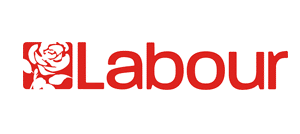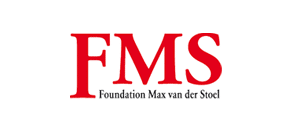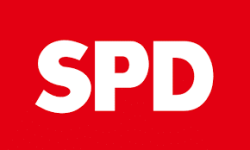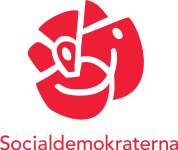Iraq

From 1979 until 2003 Saddam Hussein and the Baath Party ruled Iraq. It was a secular, but Sunni-dominated regime. In 2003 Saddam Hussein was overthrown when the US-led coalition invaded the country. Hussein was executed in 2006. When in April of 2014 parliamentary elections were held in Iraq, Haydar al-Abadi became the new Prime Minister and formed a government. One of the new government’s main aims was to re-establish security in the country. However, subsequent governments were unable to do so. In 2014 and 2015 Islamic State of Iraq and Syria (ISIS) took control over large parts of Iraq.
In the aftermath of the ISIS conflict, parliamentary elections were surprisingly won by the Shia cleric Sadr and his reform coalition. Adil Abdul-Mahdi was installed as Prime Minister and shortly after Barham Salih was appointed as President. In October of 2019, protests erupted in the capital with many other cities soon following suit. The protest movement was calling for a complete overhaul of the Shiite-dominated regime and demanded sovereignty, independence and clean government. Protesters pointed to endemic corruption and accused the political elite of putting the country’s oil wealth in their own pockets. It was brutally repressed, with 500 protesters being killed and almost 20.000 left injured.
After months of protests, Prime Minister Adil Abdul-Mahdi handed in his resignation. This happened after 40 demonstrators were killed by security forces on a single day. His government maintained its position as a caretaker government. In May of 2020, shortly after the country was struck by the COVID-19 pandemic, Mustafa Al-Kadhimi was installed as the country’s new prime minister. Protesters were glad to see Abdul-Mahdi resign, but are not satisfied yet. They have been ongoing, which is not unsurprising given the dire state of the country’s economy. In July of 2020, Al-Kadhimi announced that early elections would take place in June 2021, later rescheduled to October 10.
These elections were won by the Sadrist party, led by popular Shia cleric Muqtada al-Sadr. He runs on a anti-corruption platform and distances himself from Iran-influenced political parties in the country. Since the October 2021 elections, Iraqi politics found itself in another deadlock. Sadr wished to form a majority government with the Kurdish KDP and Sunni Taqadoom party of speaker al-Halbousi. However, this is unpopular to many parties, as this would exclude others. A coalition of the most prominent Shia parties united as the Coalition Framework (CF) against Al-Sadr’s coalition attempt. Until now, Iraq has always had coalitions that included all parties.
In the following months, Iraqi parliament remained unable to elect a president, prolonging the deadlock. In a shock move, Sadr decided to withdraw all his parliamentarians, forcing them to resign in June 2022, hoping to deligitimese the government. In October 2022, a new prime minister – Mohammed al-Sudani (CF) – was finally appointed, who then managed to form a government. The government included many old faces, demonstrating that the hard-fought protests in recent years did not lead to the demanded political changes.
-
Want to get notified by mail when this country gets updated?
Subscribe to our newsflash below!
Key Info
1 Political Situation
Iraq gained independence in 1932, after being a League of Nations mandate under British administration since 1920. The coup d’état in 1958 led to an end of the monarchy and a republic was established. From 1979 to 2003 the country was ruled by President Saddam Hussein. Until 2003 Iraq remained a de facto Arab nationalist and socialist one-party state. In 2003 the government of Saddam Hussein was overthrown by the US-led invasion. The United States claimed they invaded the country because of the presence of weapons of mass destruction, such as chemical and biological weapons, and secondly to introduce democracy. However, these weapons of destruction were never found.
Saddam Hussein was captured by American forces in December 2003, and executed by an Iraqi military court in 2006. His party, the Baath Party, was dissolved. Many Baathists, such as the former army and intelligence officers, later joined IS and have reportedly played a significant part in its rise. Elections were held in 2005 and 2010, while the country seemed to have become more stable. This image quickly changed with the emergence of the Islamic State of Iraq (ISI), a Sunni Arab rebellious group that was formed following a merger of different Iraqi insurgent groups.
In 2013 the ISI started expanding rapidly to parts outside Iraq. The group adopted the name of Islamic State of Iraq and the Levant (ISIL) in 2013 and proclaimed itself an Islamic State (IS) in January 2014. The militant group has spread over central and northern Iraq and Syria, leaving a trail of death and destruction. In response to this threat, a US-led coalition of regional and Western powers started a campaign of airstrikes in 2014. ISIS was defeated over several years. Leaving a country devastated behind. Iraq is plagued by sectarian violence, corruption and political infight. The 2018 elections yielded surprising results, but the Abdul-Madhi government had been unable to gain the trust of Iraq’s citizens.
Ongoing 2019 protests
Mass demonstrations erupted in Baghdad on the 1st of October and rapidly spread to every major city in Southern Iraq. Dominated by young people (almost 3 in 5 Iraqi’s are under 25) the protesters are overwhelmingly Shiites. But since the beginning, these protesters have called for a complete overhaul of the Shiite-dominated regime that has ruled the country since the fall of Saddam Hussein, charging it with being corrupt, incompetent, and fatally infected by sectarianism, Islamism and Iranian penetration. The demands of the protest movement were also clear: sovereignty, independence and clean government.
Instead of starting a conversation with the protest movement and initiating reform, the government almost immediately chose the path of brutal repression. Since then, hundreds of people have been killed, abducted, tortured or disappeared. Around 20,000 have been injured. Iraq’s political elite has been mostly silent about the suppression of the protesters. Few spoke out and joined. However, in December of 2019 the mounting pressure caused Abdul-Mahdi to resign. When the COVID-19 pandemic hit Iraq in March of 2020, protests were temporarily interrupted, but grew in size again in the course of 2021.
In an effort to calm those taking to the streets, newly appointed Prime Minister Al-Kadhimi announced early elections, which eventually took place on October 10, 2021. They were rescheduled because Iraq’s Independent High Election Commission (IHEC) needed more time to organise the polls. People have continued to take to the streets since then, demanding the entire political system to be dismantled. The unrest is unsurprising, considering the dire state of Iraq’s economy. Iraq is heavily dependent on its oil exports, which make up 90-95% of the state’s income. The combination of a sharp drop in oil prices and COVID-19 restrictions has proven lethal for its population.
The 2021 Parliamentary elections
The latest elections in Iraq had a chaotic run-up. The delay to October, and a boycott by the Sadrist movement in July 2021 resulted in several other parties questioning the possibility of free and fair elections. However, on August 27, Sadr decided to reverse his boycott and did eventually take part in the October elections. Iraq has an electorate of 22,116,368 eligible voters, of which 9,077,779 voted – a turnout of 41,05% (IHEC). This low turnout reflects the low legitimacy of the current political system in Iraq, as many people do not feel that voting would change anything to the current political and economic crises.
IHEC announced results on October 11 – these were ratified by the Iraqi Supreme Court on December 27, 2021. The Sadrist political bloc received 73 seats, becoming the largest party by a wide margin. The Fatah alliance, affiliated to pro-Iran militias, won 17 seats, losing many after the 48 they acquired in the 2018 elections. The Taqaduum party, Sunni-affiliated, won 37 seats, becoming second-largest in parliament. The Kurdish Democratic Party (KDP) won 31 seats. The Patriotic Union of Kurdistan won 17, one less than in 2018. An also interesting result was the seat-win of the Imtidad movement, organised by civil activists after the 2019 protests. They won 9 seats in Parliament.
Post-election deadlock
After the elections, Iraqi parliament was divided into two opposing factions: the Saving the Homeland alliance (SH) and the Coordination Framework (CF). SH consists of the the Shiite Sadrist movement, the Kurdistan Democratic Party (KDP) and the Sunni Taqadoom party. The CF includes the Shia State of Law and Fatah alliances, as well as some small Sunni parties and the Patriotic Union of Kurdistan.
Breaking the post-2003 tradition of consensus coalitions, Sadr wanted to form a majority government with the SH. This would exclude the powerful parties affiliated to the Hashd al-Shaabi (Popular Mobilization Forces), a conglomerate of Iran-loyal militias that have become forceful after the defeat of IS. These are part of the CF. Inside and outside parliament the Hashd has a major influence on Iraqi politics. As the election of a President needs the approval of two-thirds of MP’s, the CF has been able to block all proceedings in Sadr’s attempt to form a coalition. This has completely paralysed the Iraqi parliament, blocking important food and energy security bills from passing into law.
Historically, this process has always been troublesome, as various Iraqi parties attempt to gain maximal power from coalition negotiations. Power in Iraq often comes in the form of a ministry, or powerful political appointments, ensuring financial benefits for their own constituencies and leverage over rival parties. In this set-up, Iraq has been entrenched in “consensus coalitions of national unity”. These foster clientelism and have completely bankrupted and crippled the Iraqi state.
In June 2022, Sadr withdrew all his 73 parliamentarians, forcing them to resign. In doing so, he said he wanted to solve the political deadlock. The vacancies of the 73 Sadrist parliamentarians will be filled by the runner-ups in these districts during recent elections. In most cases, these will be ‘Coordination Framework’ parliamentarians, as these opposed Sadr during elections in Shia-dominated areas of Iraq. This means Sadrist voters’ trust in the government decreases only further.
Finally, in October 2022, a new government was installed, led by prime minister Mohammed al-Sudani, which ended a year-long government formation. The government consists of CF parties and supportive allies.
Kurdistan
In 1974, the Kurdistan region in Northern Iraq was granted limited autonomy by the Iraqi government. However, Iraq continuously tried to get control of the area by military interventions up until 1991, after which a no-fly zone was established above the area in 1991. One year later, the Kurdistan Regional Government (KRG) was formed by the Kurdistan National Assembly. Iraqi Kurdistan consists of the governorates of Erbil, Sulaymaniyah, Duhok and Halabja. A period of fragile peace started after the no-fly zone was introduced. The Kurdish people started to rebuild their society creating a parliamentary democracy.
The main political parties – the Patriotic Union of Kurdistan (PUK) and the Kurdistan Democratic Party (KDP) worked together during the 1990s. However, power-sharing arrangements between the two failed, erupting into a civil war from 1994 to 1997. The election in 1996 resulted in the creation of two separate Kurdish states: one state-based in Sulaymaniyah controlled by the PUK, while the other state-based in Erbil and controlled by the KDP. In 2005, Iraq officially recognized the autonomous Kurdistan Region by a referendum. The two administrations were unified into one government and the Kurdish parliament established the Kurdistan Region Presidency (KRP) as an institution.
Masoud Barzani was elected as the first President of Iraqi Kurdistan in January 2005 and was re-elected in 2009. Kurdistan suffered from the ISIS advancement in Northern Iraq from 2014 onwards. Barzani’s term was prolonged during the war. The Peshmerga proved to be an effective force against the rapid advance of ISIS. The Kurdish government reconquered lost territory and even consolidated non-Kurdish territory in Iraq. In the political and military vacuum that existed in Northern Iraq in the aftermath of the ISIS conflict, Barzani called for an independence referendum, causing major international upheaval.
Although the central government in Baghdad didn’t acknowledge the legitimacy of the referendum, the Kurdish government went ahead with a vote in September 2017. An overwhelming majority of 92.73% voted for independence. However, Barzani was hesitant to declare Kurdistan independent. No country supported the referendum. In the meantime, Bagdad started a military offensive to reclaim the non-Kurdish territory in Northern Iraq. Barzani eventually resigned as president, leaving the independence movement without a direction and the region without a president until regional elections in late 2018. Nechirvan Barzani has assumed office as president in June of 2019.
Women’s rights
The Iraq war and expansion of ISIS have had a negative impact on the lives of women in Iraq. Many women have become widowed, due to a series of wars and internal conflicts. Especially in the conflict zones, there has been an increase in the oppression of women. The 1970 adopted Iraqi constitution gave women equality and liberty, but since the US-invasion and civil war Iraq has backslidden on women’s rights. The in 2005 adopted constitution states that Islam is the core source of legislation, not contributing to women’s rights. Several components of Iraq’s family law are discriminatory towards women, especially when it comes to divorce, child custody and inheritance. A woman’s testimony is also worth half of that of a man in some cases. Child marriages remain another challenge, with 24% of Iraqi girls being married before turning 18 and 5% were married before the age of 15, in 2018.
There is also still a considerable gender gap when it comes to education and women’s participation in the labour force. Only 12.3% of women were employed or looking for work in 2018. Meanwhile, 26.4% of Iraqi women were illiterate, with numbers above 50% in rural areas, according to a 2019 UNESCO estimate. This number is 11% for men. The education gap is narrowing though, partly because of the hard work of women’s rights organisations. They continue to struggle against harassment and intimidation. In 2008 polygamy was partially abolished in Iraqi Kurdistan regions and Female Genital Mutilation (FMG) was declared criminal. Since the start of the COVID-19 pandemic and its lockdown measures, media reported an increase in domestic violence against women.
LGBTI rights
A ban on homosexuality was introduced under British rule and maintained when Iraq became independent in 1932. After the ousting of Sadam Hussein in 2003, homosexuality has become legal on paper. However, in practice homosexuality is not legal, as LGBTI people can still be charged under public indecency law. When convicted under Paragraph 401, people can be charged with a fine and 6 months in prison. LGBTI individuals are subject to widespread discrimination and have no legal means to protect themselves. As such, executions, beatings, honour killings and torture are common. Being gay, or even looking gay, can mean a death sentence under the widely used Sharia law. Reports suggest that the situation has only worsened after the 2003 invasion of the country.
As a result of the harsh societal discrimination and violence, Iraq’s LGBTI community has been one of the most invisible communities in the world. There was barely any LGBTI activism, but the first LGBTI organisations have started working in Iraq now. Rasan was established in 2004 as a feminist women’s rights organisation, but as a partner of COC Nederland started a “Pride Program” in 2012. Another organisation is IraQueer, which developed from an underground Iraqi LGBTI community. Without any political parties advocating for the interests of the LGBTI community and the government denying persecution of LGBTI individuals, these organisations are essential to better the living circumstances for LGBTI individuals.
2 Elections
Electoral system
According to the constitution of 2005, Iraq is a parliamentary democracy with a multi-party system whereby the executive power is exercised by the prime minister, president and Council of Ministers. The president is elected by the Council of Representatives. He or she nominates the prime minister, who has to be approved by the Council of Representatives. The power in Iraq has been shared along ethno-sectarian lines since 2003. Thus the position of prime minister is held by a Shia Arab, the speaker of parliament by a Sunni Arab and the presidency by a Kurd. The president serves mainly a ceremonial function.
The prime minister is the head of government and is the executive authority. The legislative power is vested in the Council of Representatives and the Federation Council. From the 328 seats in the Council of Representatives, 320 members are directly elected in multi-seat constituencies by proportional representation. The remaining eight seats are reserved for minorities. There is also a 25% gender quota, making sure 26,4% of parliament is made up of women. The Council of Representatives is elected for four years.
2019 Election Law amendments
With the pressure on the government mounting, the Abdul-Mahdi-led government approved the amendment of the Election Law. The alterations allow voters to elect individual legislators instead of choosing from a party list and make sure that each member of parliament represents a specific electoral district, instead of groups of legislators representing entire provinces. This gives independents a better chance of being elected. Previously, parties ran on unified lists and were able to sweep all of the seats in some of the country’s 18 districts, which are now divided into 83 districts.
Parliament of Kurdistan
The Kurdistan Parliament has 111 seats and consists of one elected chamber. In 2009 amendments were made to the election law to increase the inclusiveness of all groups. The minimum age of parliamentary candidates was lowered from 30 to 25. The quota of female MPs was increased from 25% to 30% of the legislature and seats reserved for minority Christian and Turkmen communities were increased to five seats each. Elections are held every four years. Every citizen of the Kurdistan Region with a minimum age of 18 years and on the electoral register is eligible to vote in a direct, universal and secret ballot.
Parliamentary elections
Latest Iraqi parliamentary elections were held on October 10, 2021. Elections were originally planned for June 2021, but delayed as the Independent High Electoral Commission (IHEC) needed more time to organise the elections properly. It were the first elections conducted under the new electoral system, that had changed in 2019.
Results
Voter turnout was 41.05%, the lowest since the first democratic elections in 2005 after the fall of Saddam Hussein. Turnout was relatively high in some of Kurdistan’s regions, with Duhok having the highest turnout nationally with 54%. Kurdistan’s capital Erbil saw a turnout of 46%. Suleymaniyah, the region’s second largest city and the scene of large anti-government protests throughout 2020-2021, saw a turnout of 37%, much lower than neighboring provinces, indicating the low trust in political institutions. This was also visible in Iraq’s federal area – as Baghdad’s both provinces had a low turnout. In Baghdad-al-Rusafa it was 31%, and in Baghdad-Karkh 34%. Iraq’s southern port city Basra, also its second largest city, saw a turnout of 40%. In previous years, Basra has been the scene of many anti-government protests. See the results of the largest parties below.
| Party | Leader | Result 2021 election (%) | Result 2021 election (seats) | Difference with 2018 result (seats) |
| Sadrist Movement | Moqtada al-Sadr | 10.00 | 73 | +19 |
| Progress Party (Taqadoom) | Mohamed al-Halbousi | 7.20 | 37 | new |
| State of Law Coalition | Nouri al-Maliki | 5.67 | 33 | +8 |
| Kurdistan Democratic Party | Massoud Barzani | 8.83 | 31 | +6 |
| Fatah Alliance | Hadi al-Amiri | 5.23 | 17 | -31 |
| Patriotic Union of Kurdistan | Bafel Talabani | 4.16 | 17 | -1 |
| Azm Alliance | Khamis al-Khanjar | 4.76 | 14 | new |
| Emtidad | Alaa al-Rikabi | 3.38 | 9 | new |
| New Generation Movement | Shaswar Abdulwahid | 2.64 | 9 | +5 |
| Victory Alliance | Haider al-Abadi | 4.06 | 4 | -38 |
Observer reactions
The European Union Election Observation Mission in Iraq expressed its worry on the low turnout in the elections and press freedoms. However, it indicated that the elections were technically well-managed and competitive, despite many challenges. According to the spokesperson, these challenges include the electoral reform and some aspects of the legal framework. The United Nations Assistance Mission for Iraq (UNAMI) deployed a similar stance, reporting that the elections proceeded smoothly and observing that significant improvements were made regarding the electronic voting system in the country. They also condemned the threats of violence towards IHEC and UNAMI personnel.
Presidential elections
The President is elected by a two-thirds majority of the Council of Representatives, Iraq’s Parliament. The President is elected to serve a four-year term in office, after which he may be re-elected once. The President approves laws which have been passed by Parliament and is the ceremonial head of the Armed Forces. He also fulfils ceremonial duties for Iraq. The President is aided by two Vice-Presidents. Together they form the Presidency Council, which makes decisions by unanimous vote. From 2018-2022, Barham Salih has been the president. After the main presidential candidate, Hoshyar Zebari, had been ruled out by the Iraqi Supreme Court, Abdul Latif Rashid was appointed the new president of Iraq beating outgoing president Salih.
Within two weeks of the appointment of the Presidency Council, a prime minister must be appointed unanimously. If it fails to do so, the responsibility in appointing a new PM goes to the National Assembly. An absolute majority is needed there to confirm a nomination. If the new PM is unable to nominate his Council of Ministers within a month, the Presidency Council will name another new PM. Mohammed al-Sudani succeeded in forming a new government and became the new Prime Minister in October 2022, which ended the 2022 Iraqi political crisis.
3 Political Parties
Social Democratic Parties
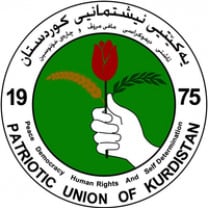
Number of seats: 17 (Iraqi parliament), 21 (Kurdistan
The Patriotic Union of Kurdistan (PUK) was founded on 1 June 1976. It was founded as a response to the end of the first Kurdish uprising that started throughout the 1960s and ended in March 1970 with an agreement between the Iraqi government and the Kurdish people. The PUK used to be a coalition of at least five separate political entities, of which the most significant was Mam Jalal Talabani.
The PUK is a social democratic party and its principal values are democracy, human rights, and the right to self-determination. It can best be classified as a centre-left party. The party strives to provide equality in job opportunities, to promote the independence of individuals, to prevent oppression and to eradicate racial and gender-based discrimination. In the years after its founding PUK ruled together with the KDP until disagreements drove the parties apart, and a civil war followed from 1994-1998.
The KDP lost 1 seat in the 2021 elections, after some internal struggles and popular unrest in the Kurdistan regions.
Other Parties
Number of seats: 73
The Sadrist movement draws wide support in Iraqi society and draws its support from impoverished Shia regions in the country, especially Baghdad’s Sadr City district. The movement is religious and populist. The movement successes the Mahdi Army, established by Muqtada Al-Sadr to “liberate Iraq''. Al-Sadr called for political resistance against the US occupation. Between 2003 and 2008 it promoted a strong anti-Western discourse, leading to clashes with US. The Sadrist Movement has since played a key role in Iraqi politics.
Al-Sadr, the son of a famous Iraqi religious figure that opposed Saddam Hussein, has built a strong movement that opposes foreign influence in the country, both Western as Iranian. From 2018 onwards, his party cooperated with the Communist party, among others in the Sairoon (Forward) Alliance. In 2021, he ran his own list, the Sadrist movement. The Sadrist Movement is well-organised and studied the new electoral reform accurately, making sure that its candidates did not compete for the same voters.
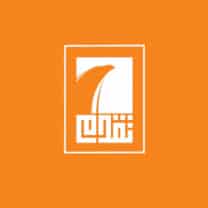
Number of seats: 37
The new Taqadoom party immediately entered as the secondbiggest-party in the 2021 elections. Taqadoom is a Sunni-affiliated party. It is nationalist and can be considered as a catch all-party. Taqadoom is led by Mohamed al-Halbousi, the Iraqi speaker of Parliament, and also owner of a major infrastructure company in the Anbar province.
In this province, the Progress Party did particularly well. Sunnis in Ninewa and Salah-el Din also voted on Halbousi, as they hope that similar efforts in infrastructure investment will happen in their provinces. The Progress Party benefited from a low turnout in Sunni dominated areas. The party invested greatly in relations with Sunni tribal leaders and won many seats in these areas.
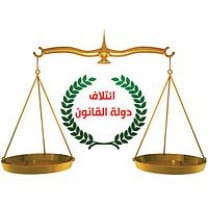
Number of seats: 33
In October 2009 former Prime Minister Nouri al-Maliki announced the formation of the Shiite State of Law alliance (SLA), distancing himself from the Iraqi National Alliance (INA). The alliance was announced as a nationalist, non-sectarian political list, but this failed after not attracting significant Sunni or other minority participation. The alliance can best be described as a big-tent movement, combining elements from across the conventional left–right political spectrum. It has a strong voter base in the Shia constituency. After losing many seats during the 2018 elections, the alliance has functioned as an opposition group.
After the 2021 elections, Maliki’s party did well – taking many seats of the Fatah Alliance. Maliki, as a former prime minister and a strong civilian leader now appears the main rival to Sadr in forming a government with the support of smaller parties.
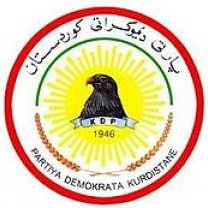
Number of seats: 31 (Iraqi parliament), 45 (Kurdistan
The KDP is a Kurdish party based in the northern governorates of Dohuk and Erbil and was founded in 1946. KDP is one of the oldest parties in Iraqi Kurdistan. It strives for independence of Iraqi Kurdistan. The party is regarded as being populist and nationalist. The big-tent party is dominated by the Barzani tribe. The current leader of the KDP is Masoud Barzani, who was elected in 1979 and has been re-elected ever since. In June 2005 he was elected as the President of Iraqi Kurdistan. He stepped down in 2017, following the Kurdisch referendum, but maintained his position as party leader of the KDP.
The KDP profits from its well-run organization, similar to the success of Sadr in Federal Iraq, and has therefore been able to acquire a positive result in the 2021 election.
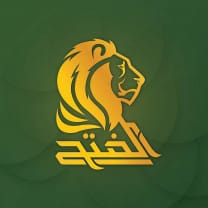
Number of seats: 17
The Fatah Alliance is led by Hadi Al-Amiri, the leader of the Badr Organization, and was established shortly before the 2018 elections. It focuses on a Shia constituency. Hadi Al-Amiri is the former Minister of Transport. The alliance is a split-off from the State of Law Coalition. The alliance is best described as a big tent party, considered right-wing on the political spectrum. The Fatah Alliance includes the Badr Organisation, the Al-Sadiqoun Bloc (the political wing of Asa'ib Ahl al-Haq, AAH) and Kata'ib al-Imam Ali, all key components of the Hashed. The Hashed is a state-sponsored umbrella organization that fought against IS with the Iraqi Army. It now is a major non-state armed actor in Iraq. The alliance gained 48 seats in the 2018 elections, but lost big in 2021.
It fielded many candidates who run in the same electoral districts, thus disproportionally losing many seats compared to its loss in total votes. Another reason for Fatah’s loss is that many voters moved to the State of Law Coalition. These are dissatisfied with the corruption of the parties in the Fatah Alliance.
Number of seats: 14
The Azm Alliance is a new party, gaining 14 seats. It is a Sunni-affiliated party, and an important rival to the Progress (Taqadoom) party. Al-Khanjar is a Dubai-based multimillionaire, a proponent of federalizing Iraq between Sunni, Shia and Kurds. Al-Khanjar is a controversial figure, since the Iraq war. He was sanctioned by the US in 2019 for being involved in killing innocent demonstrators in Iraq.
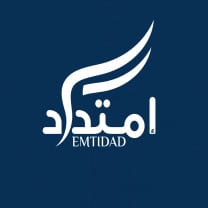
Number of seats: 9
The Emtidad Movement was founded in December 2020, as a reaction to the 2019-2021 Iraqi protests. It wants to establish a youth civil movement as an alternative to the current political parties that are deemed corrupt and ineffective. Emtidad, meaning extension, wants to politically voice the demands of the protesters. They are against sectarianism and corruption. In the first parliamentary session, on Jan. 9, 2022, MPs from Emtidad rode tuk-tuks to the Parliament, in memory of the casualties during the protests, as tuk-tuks became an import mode of transportation to move people to the hospital during the protests.
Emtidad did excellent in its first election, as it won several city districts. By sometimes fielding only one candidate in cities such as Nasiriyah, it could have won even more. Its potential shows Iraqi voters who sympathized with the protest movement still have hope to engage in political reform through voting.
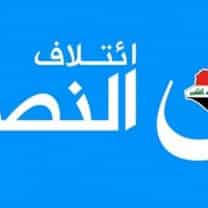
Number of seats: 4
The Victory Alliance was established by former Iraqi Prime Minister Haider al-Abadi in 2017. It is a split from the State of Law Coalition, which was formed in 2009. The party is best described as a centre party, with pragmatic political views. The Victory Alliance was established in expectation of the 2018 elections, in which the alliance managed to gain 42 seats, becoming the third largest political group in Iraq’s parliament. In 2021, it lost big, similar to Fatah Alliance, as they fielded rival candidates in small constituencies.
4 Biographies
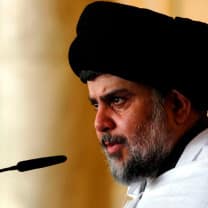
Muqtada al-Sadr is the leader of Iraq's biggest party, the Sadrist faction. Sadr is a major Iraqi political figure, ever since the 2003 US invasion. He has been a fierce opponent of foreign intervention in Iraq, both from the US as Iran. He is the son of grand ayatollah Mohammed Sadiq al-Sadr and is an important leading figure for Shia Iraqis, especially in poorer regions. Sadr City is one of his main constituencies where he has an immense following - this part of Baghdad being renamed from Saddam City to his family name after the fall of the Baath regime.
In the latter decade, Al-Sadr has joined demonstrations and ran lists at parliamentary elections. He is known for being pragmatic, making coalitions with various parties to ensure stable forms of power. In 2018, he ran with the communist party - the Sairoon (Forward) alliance - gaining 54 seats. At the October 2021 elections, Sadr's own movement became the biggest party, with 73 seats. However, he withdrew all his parliamentarians after his attempt on forming a majority coalition failed.

Mohammed Al-Sudani is the current Prime Minister of Iraq. He was officially assigned as PM on October 27 2022, after a political deadlock of a year. He succeeded in forming a government mostly consisted of Coalition Framework parties and disciples. Al-Sudani has improved public services so far, but the underlying flaws that enable corruption to flourish have yet to be tackled. Iraqi people are not yet satisfied as the corrupt and nepotistic political system still prevails. Despite the tense situation, Al-Sudani has the task to not let the government fail again, as this would possibly spark a new range of protests.
Al-Sudani, a Shia from the Maysan Province has been politically active since 2004. He has served as governor of Maysan (2009-2010), Minister of Human Rights (2010-2014) and Minister of Labour and Social Affairs (2014-2018). He held all his positions as an independent.
Al-Sudani holds a bachelor's degree in Agricultural Science and a master's degree in Project Management. He is married and has four sons.
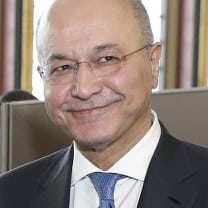
Barham Salih (1960) is the former president of Iraq. He was elected by a big parliamentary majority as the 8th President of Iraq on 2 October 2018. Salih has been a leading figure in Iraqi politics for quite some years. Before, he was Prime Minister of the Kurdistan Region and a former deputy prime minister of the Iraqi federal government. He holds a bachelor’s degree in Civil Engineering and Construction from Cardiff University and a doctorate degree in Statistics and Computer Applications in Engineering from the University of Liverpool.
For most of his political career, Salih has been a member of the Patriotic Union of Kurdistan (PUK). In September 2017, he left the PUK and formed a new opposition party, the Coalition for Democracy and Justice. His aim was to challenge the governing KDP-PUK alliance. In 2018 Salih re-joined the PUK, which was greeted with anger by many on social media. The move was seen as opportunistic since he had recently been campaigning against the PUK and KDP corruption. Others expressed hope that his international experience would bring stability to the country. He maintained his post as president while large scale protests had been ongoing since October 2019.
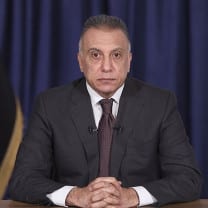
Mustafa al-Kadhimi served as PM from May 2020 to October 2022. At the time, he was the third attempt of President Barham Salih to install a new prime minister after months of large scale protests and political deadlock. As an independent, he managed to form a government and was officially installed as prime minister on May 6. Kadhimi promised to get the country back on its feet, but his government was installed amid the COVID-19 pandemic, economic downturn and falling oil prices.
After being born in Baghdad in 1967, Kadhimi moved to Germany and the United Kingdom. He gained a law-degree and is known for his work in journalism and opposition against the rule of Saddam Hussein.
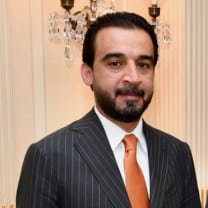
Mohamed al-Halbousi is since 9 January 2022 the Iraqi Speaker of Parliament. He is the leader of the Progress Party (Taqadoom) and is a major Sunni figure in the Iraqi political landscape. He was previously the governor of the Anbar governorate, where he has a strong voter base. With the 2021 October elections, where Taqadoom came second with 37 seats, Al-Halbousi was viewed as an important potential ally for the Sadrist Movement. He was therefore targeted multiple times with terror attacks in January 2022, with the goal of deterring him to form a coalition and excluding certain factions into opposition.
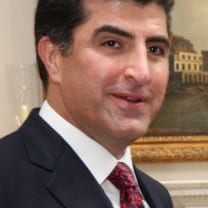
Nechirvan Idris Barzani (1966) is the President of the Kurdistan Region. He was elected into office by the regional parliament in June 2019. Throughout his political career, he has served twice as Prime Minister of the Kurdistan Regional Government and as Vice President of the Kurdistan Democratic Party. His father, Idris Mustafa Barzani, was also a prominent and senior KDP political figure. Barzani has a degree in Politics and International Relations from the University of Tehran.
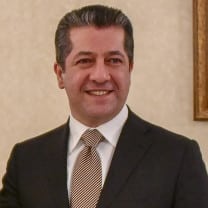
Masrour Barzani (1969) is currently the Prime Minister of the Kurdistan Region in Iraq. He assumed office in 2019. He is also the chancellor of the Kurdistan Region Security Council and a prominent member of the Kurdistan Democratic Party. At a young age he joined the Peshmerga, the Kurdish resistance fighters, in the battle against Saddam Hussein’s army. Later, he went to London for a year-long course in English after which he continued with a bachelor’s degree in International Studies at the American University in Washington D.C. He also completed a master’s degree in Conflict Resolutions.
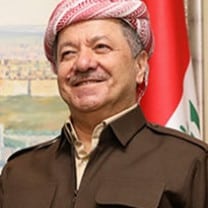
Masoud Barzani (1946) is the leader of the Kurdistan Democratic Party. He has served as the President of the Kurdistan Region from 2005 to 2017, when he resigned in the aftermath of the failed independence referendum. He assumed the position of KDP party leader in 1979 when he succeeded his father, the Kurdish nationalist leader Mustafa Barzani.
Bafel Talabani is the current leader of the Patriottic Union of Kurdistan and the oldest son of former PUK leader Jalal Talabani. He is credited for re-instating important relations with former PUK members and was also able to form a joint list with the Gorran Movement for the 2021 elections. Leading up to the 2021 elections, division inside the PUK party flared again as violence broke out in Sulaymaniyah at a local broadcasting station. Bafel and his cousin, Lahur Talabani, share the presidency of the PUK since 2020, but are involved in a fierce power struggle ever since. In November 2021, Lahur Talabani was expelled from the party.
Subscribe to our newsletter
